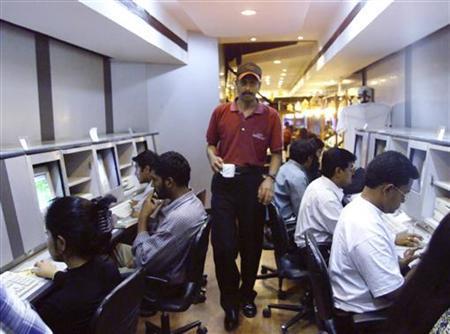Photographs: Savita Kirloskar/Reuters Devjyot Ghoshal in New Delhi
After decades of riding storms and chasing deals, the Indian information technology juggernaut is being confronted with a grave challenge.
Having cornered some 10 per cent of the $700 billion global outsourced IT services market - and in the process, matured from greenhorn start-ups to billion dollar entities straining for more growth - it is now time for Indian IT majors to compete with the international big boys, such as IBM and Accenture, for some $193.4 billion of contracts up for renewal through till 2016.
But the question is: do the Indian players have what it takes to play in the big leagues?
All signs point to a bleak future. The existing business model for the majority of the Indian IT sector, leaning heavily towards providing application development and maintenance services with a high priority on cost saving and labour arbitrage has failed to remain a sustainable long-term plan.
Take a look at dollar revenue growth for Indian IT companies.
...
IT sector in India faces growth dilemma
Image: Overall sectoral growth this year will fall between 11 to 14 per cent.Photographs: Paul Hackett/Reuters
This, according to a report by UBS, has slowed from the 2004-08 highs of 30 to 35 per cent to the mid-to high-teens currently, driven by slower end-user demand and commoditisation of traditional services offerings such as ADM.
Moreover, Nasscom, the industry's apex body, predicts that overall sectoral growth this year will fall between 11 to 14 per cent from 16.3 per cent that it recorded last year.
Not only are customers now demanding a wider and more complete array of services, but "even in the cost-plus value play Indian IT companies are now competing with the likes of IBM, Accenture, Capgemini and CSC," says Arup Roy, Principal Research Analyst at Gartner, an IT research firm.
"It is now a level-playing field. This is leading to a re-think, and driving the change or the so-called transformation in the sector," he adds.
According to a Standard Chartered Bank analysis, the next leg of growth for Indian offshore players will be driven by market share acquisition from global players in existing contracts coming up for renewal.
And there are over 1,000 contracts that are with non-Indian vendors with a combined contract value of $193.4 billion due for renewal over the next five years, the bank estimates.
...
IT sector in India faces growth dilemma
Image: International heavy hitters have right of entry to the boardroom.Photographs: Andrea Comas/Reuters
However, for an industry that is slated to see its revenues touch $100 billion this year, India's IT sector continues to be massively reliant on ADM-oriented deals, with low penetration in infrastructure (management of a company's IT systems and infrastructure) and total IT outsourcing deals.
While this reliance on ADM may not have hurt Indian IT players so far, an inkling of the challenge ahead can be ascertained from the forecasted pipeline of deals up to 2016.
Of the total estimated $193.4 billion worth of deals up for grabs, $93.5 billion and $67.8 billion are IT and Infrastructure outsourcing agreements, while only some $32 billion are application deals.
"When you were a $200-million firm, this $32 billion market would have looked great. But when you are an $8-billion company, this won't nourish you. So how will you grow?
"You have to become competitive, you have to have the capability to blend all your services into one integrated offering and have the entire suite of services that the big boys have and beyond," says the chief marketing officer of a leading Indian IT firm, who didn't want to be quoted.
But the international heavy hitters of the IT sector have another advantage: right of entry to the boardroom.
...
IT sector in India faces growth dilemma
Image: TCS wants 10 per cent of revenues from non-linear initiatives.Photographs: Reuters
"Despite the top Indian players having established their brands globally and having cutting edge solutions across certain verticals and functions, boardroom access still eludes most of them.
"They are still looked upon as vendors instead of partners, as against how the global players are positioned in the marketplace," reads a report by KPMG, which suggests that a raft of non-linear models - where business and headcount growth are delinked - including cloud computing, platform BPOs, intellectual property and mergers and acquisitions will propel the industry.
Yet, these are very early days for non-linear paradigms across the Indian IT industry. Infosys, for instance, aims to generate 33 per cent of its revenues from innovation-led non-linear functions in the next six to seven years, while TCS wants about 10 per cent of its annual incremental revenues from non-linear initiatives.
But both currently derive less than 10 per cent of its revenues from this model, says a report by UBS, with only one to two per cent increase in revenue contribution from these functions.
This sluggish progress is in spite of Infosys' ownership of Finacle, a suite of core banking products, and TCS having acquired product capabilities through its acquisitions of CMC Ltd and FNS.
Then, there is the hallowed dream of consulting-led growth.
"Today if you go to a client and say I will do offshore to reduce cost, it is a generic thing and every player has it. If you need to solve big problems for the client, you need to be a transformational partner for the client and for that consulting becomes key," says V Balakrishnan, CFO of Infosys.
...
IT sector in India faces growth dilemma
Image: Finding the right quantity of quality people will be tricky, says an expert.Photographs: Reuters
Although a small start was made a few years back when the top IT players started to get their consulting focus in place, the current contribution of pure-play consulting to the overall revenue is in single digits for some of the top tier firms.
But the move into the boardroom - a shift that will require firms to do away with the existing blueprint of labour cost arbitrage and embrace high-value specialization - will also need a new kind of Indian techie: one with domain expertise and essential IT skills.
"The industry has moved away from the labour arbitrage game, in the future what will matter is expertise and competency. We all over time need to become experts. This real expertise can change the revenue per employee paradigm," says Pramod Bhasin, Vice-Chairman of Genpact, which began as a business unit within GE in 1997.
Finding the right quantity of quality people will be a "sticky issue" in the medium-to-long term, predicts former Nasscom chairman Kiran Karnik, as the IT industry has failed to remain the top choice for large section of students graduating from Indian universities.
"The industry won't just need people who are good at writing code, but those who can solve business problems and innovate. Instead of innovation, our education system is geared towards repetition. As the quality requirements go up, this (human resource crunch) will become quite serious," adds Karnik.
...
IT sector in India faces growth dilemma
Image: Indian IT-BPO sector has certainly had much success to look back upon.Photographs: Hannibal Hanschke/Reuters
Moreover, despite its inherent strengths and strong track record, India is losing out to new low-cost destinations like the Philippines.
Former Infosys CFO Mohandas Pai estimates that some 500,000 jobs have been lost to the Philippines alone, which has steadily grown in recent years to corner approximately $7.38 billion worth of voice-based outsourcing work, compared to India's $7 billion.
"Some part of the employment is moving out because the business environment is not as friendly. Instead of the red carpet, there is harassment by the IT (Income Tax department) and bureaucratic hassles," adds Karnik.
The outsourcing exodus, however, points to a larger problem of domestic governance and regulatory issues that has plagued the Indian IT industry.
"Past couple of years have seen the government rolling out policies that are not favourable for the industry. In addition, the tax authorities have been very aggressive with respect to imposing tax regulations on the Indian IT players as well as MNCs who have set up captive centres in India," says KPMG in a recent report.
Without a doubt, the Indian IT-BPO sector has certainly had much success to look back upon, but as KMPG's Partner and Head for the IT-BPO sector, Pradeep Udhas, pithily put it, "the world isn't going to make it easy for the Indian IT industry". The world, in this case, includes the Indian government.
(With inputs from Shivani Shinde in Mumbai, Pradeesh Chandran in Bangalore and Swati Garg in Kolkata)








article